The global e-drive for automotive market was valued at $9.6 billion in 2021, and is projected to reach $21.5 billion by 2031, growing at a CAGR of 8.8% from 2022 to 2031.
E-drive, also referred as electric-drive, utilizes battery as a power source to provide efficient transmission in the vehicle. It converts electrical energy to mechanical energy to ensure efficient movement of the wheels in the vehicle. In addition, E-drive comprises electric brake booster, motor generator, power booster, and a battery. Moreover, e-drive ensures improved energy utilization in the vehicle and has several advantages such as low operating costs, higher efficiency, lower noise, and clean operation.
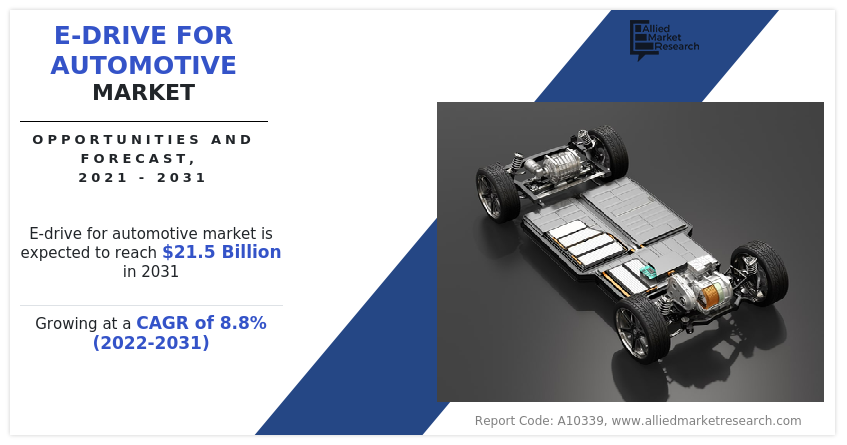
The growth of the global e-drive for automotive market is propelling, due to stringent government rules and regulations toward vehicle emission and rise in demand for electric vehicles. However, high cost of e-drive systems is the factor hampering the growth of the market. Furthermore, technological advancements is the factor expected to offer growth opportunities during the forecast period.
The e-drive for automotive market is segmented on the basis of electric vehicle type, vehicle drive type, application, and region. By electric vehicle type, it is divided into battery electric, plug-in hybrid, and hybrid. By vehicle drive type, it is classified into front wheel drive, rear wheel drive, and all-wheel drive. By application, it is fragmented into passenger cars and commercial vehicles. By region, the report is analyzed across North America, Europe, Asia-Pacific, and LAMEA.
Some leading companies profiled in the e-drive for automotive market report comprise Aisin Corporation, BorgWarner Inc., Continental AG, Hitachi Ltd., Magna International Inc., Melrose Industries PLC, Nissan Motor Co., Ltd., Robert Bosch GmbH, Schaeffler AG, Siemens AG, Toyota Motor Corporation, and ZF Friedrichshafen AG.
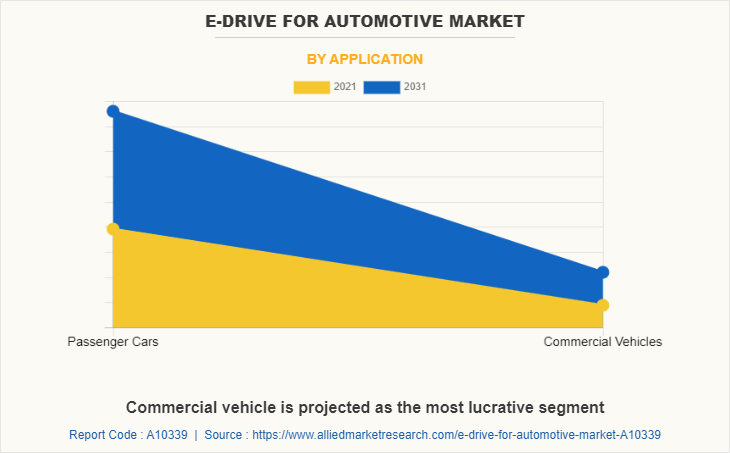
Stringent government rules and regulations towards vehicle emission
With the growing environmental concerns, governments and environmental agencies across the globe are enacting stringent emission norms and laws to reduce vehicle emission. Major regulatory measures are stringent emission targets for the reduction of nitrogen oxides (NOx) and carbon dioxide (CO2) in air. High amounts of greenhouse gases being emitted from vehicles and federal and state governments in the U.S. are increasing efforts to make transportation cleaner. For instance, the U.S. Environmental Protection Agency (EPA) announced that they are working on new rules to decrease emissions of nitrogen oxide (NOx) and other pollutants from heavy-duty trucks.
In addition, the California Air Resources Board (CARB) is adopting heavy-duty Low NOx Omnibus Regulation, aims to achieve a 90% reduction from current NOx emissions limits by 2027. Moreover, in Europe, European Union (EU) committed within the Paris agreement (COP21) to achieve its 20% greenhouse gas reduction target in 2020 for the second phase of the Kyoto Protocol. The EU has also set the target to achieve 40% greenhouse gas reduction by 2040 and net-zero by 2050.
Therefore, the burden on vehicle manufacturers, especially on commercial vehicle manufacturers, has further increased, with enactment of the emission regulations for fossil fuel-powered vehicle. This, in turn, is expected to drive the demand for electric vehicles. Electric vehicles comprise e-drive which control the motion of electric vehicle. Therefore, increase in demand for electric vehicle is projected to result in increase in demand for e-drive. Thus, stringent emission norms imposed on fossil-fuel powered vehicles significantly drive the growth of the e-drive for automotive market.
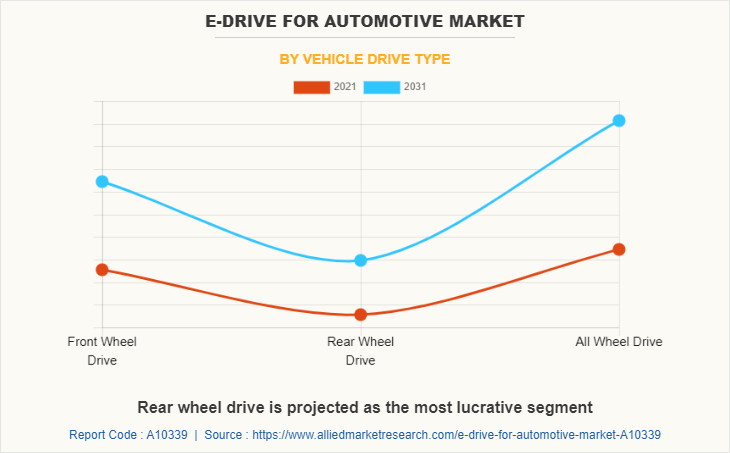
Rise in demand for electric vehicles
Increase in global concerns regarding the negative effect of climate change and alarming pollution levels recorded in major cities have created a significant demand for electric vehicles. The demand for fuel-efficient vehicles has increased recently, owing to rise in price of petrol and diesel. Depletion of fossil fuel reserves and growth in tendency of companies to gain maximum profit from these oil reserves also contribute to the increase in demand. Therefore, these factors give rise to the need for advanced fuel-efficient technologies, leading to surge in demand for electrically-powered vehicles for travel, which generates the demand for e-drive and motors. E-drive is most common in electric vehicles. Therefore, increase in sale of electric vehicle boosts the growth of e-drive. Further, increase in popularity of electric vehicles gives rise to many innovations in e-drive, which drive the growth of the e-drive for automotive market.
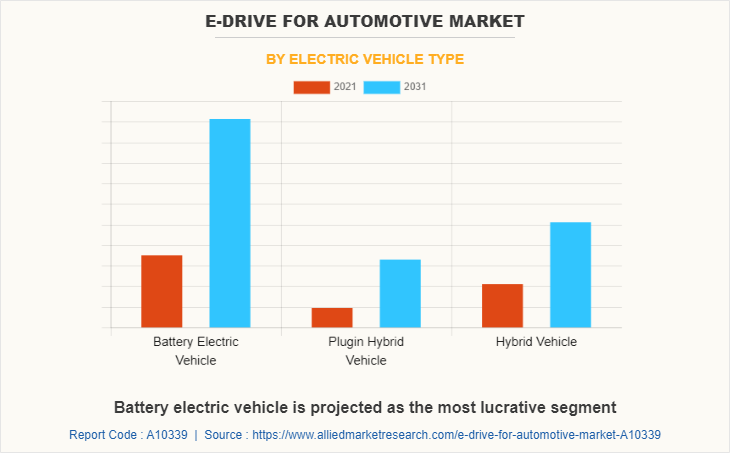
High cost of e-drive systems
Electric vehicles are advantageous over conventional vehicles, but the cost of the former is higher than gasoline powered vehicles. In addition, the unavailability of infrastructure related to electric vehicle growth has proved to be a negative factor, which affects the growth of the electric vehicle industry. Demand for components installed in an electric vehicle decreases due to this unavailability of proper infrastructure, thus affecting the growth of the automotive e-drive industry. In addition, advanced technologies for e-drive which includes e-axel, and e-wheel drive are still expensive, which in turn is forcing vehicle manufacturers to offer e-drive systems in moderate-high ranged electric cars, thereby restraining the growth of the market. Thus, high cost of e-drive systems is expected to hamper the growth of the market during the forecast timeframe.
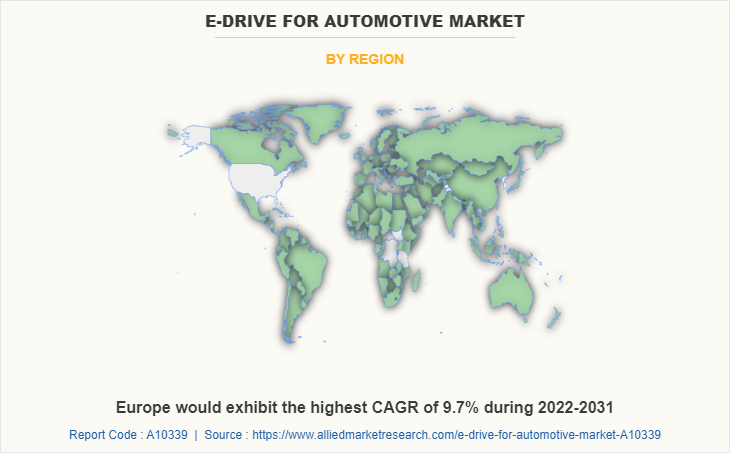
Key Benefits For Stakeholders
- This report provides a quantitative analysis of the market segments, current trends, estimations, and dynamics of the e-drive for automotive market analysis from 2021 to 2031 to identify the prevailing e-drive for automotive market opportunities.
- The market research is offered along with information related to key drivers, restraints, and opportunities.
- Porter's five forces analysis highlights the potency of buyers and suppliers to enable stakeholders make profit-oriented business decisions and strengthen their supplier-buyer network.
- In-depth analysis of the e-drive for automotive market segmentation assists to determine the prevailing market opportunities.
- Major countries in each region are mapped according to their revenue contribution to the global market.
- Market player positioning facilitates benchmarking and provides a clear understanding of the present position of the market players.
- The report includes the analysis of the regional as well as global e-drive for automotive market trends, key players, market segments, application areas, and market growth strategies.
E-Drive for Automotive Market Report Highlights
| Aspects | Details |
| Market Size By 2031 | USD 21.5 billion |
| Growth Rate | CAGR of 8.8% |
| Forecast period | 2021 - 2031 |
| Report Pages | 273 |
| By Electric Vehicle Type |
|
| By Vehicle Drive type |
|
| By Application |
|
| By Region |
|
| Key Market Players | Magna International Inc., ZF Friedrichshafen AG, BorgWarner Inc., GKN PLC, NISSAN MOTOR CO., LTD, AISIN SEIKI Co. Ltd., Continental AG, E-TRACTION B.V, Robert Bosch GmbH, Hitachi, Ltd, Toyota Motor Corporation, Schaeffler AG |
Analyst Review
The global e-drive for automotive market is expected to witness significant growth due to stringent government rules and regulations toward vehicle emission and rise in demand for electric vehicles.
In recent years, the demand and production of electric vehicles have increased significantly as electric vehicles have several advantages over fuel-powered automobiles. Automobile manufacturers are focusing toward the development of electric vehicle with in-wheel motor, owing to improved vehicle dynamics and traction control. Moreover, increase in penetration of electric vehicles is anticipated to surge the demand for e-drive systems. In addition, companies are focusing on the development of e-drive technologies for battery electric vehicles which fuels the growth of the market. For instance, in July 2021, GKN Automotive accelerated the development of its next-generation e-drive technologies to support rise in global demand for electric vehicles. The new e-drive technologies are projected to provide faster charging time, superior performance, and increased driving range for battery electric car.
Key players operating in the global e-drive for automotive market include Aisin Corporation, BorgWarner Inc., Continental AG, Hitachi Ltd., Magna International Inc., Melrose Industries PLC, Nissan Motor Co., Ltd., Robert Bosch GmbH, Schaeffler AG, Siemens AG, Toyota Motor Corporation, and ZF Friedrichshafen AG.
The global market was valued at $9.56 billion in 2021 and is projected to reach $21.54 billion in 2031, registering a CAGR of 8.8%.
The top companies in the market include Aisin Corporation, BorgWarner Inc., Continental AG, Hitachi Ltd., Magna International Inc., Melrose Industries PLC, Nissan Motor Co., Ltd., Robert Bosch GmbH, Schaeffler AG, Siemens AG, Toyota Motor Corporation, and ZF Friedrichshafen AG.
The largest regional market is Asia-Pacific.
The leading application is passenger cars.
The upcoming trends include greater demand from battery electric vehicles and technological advancements.
Loading Table Of Content...


